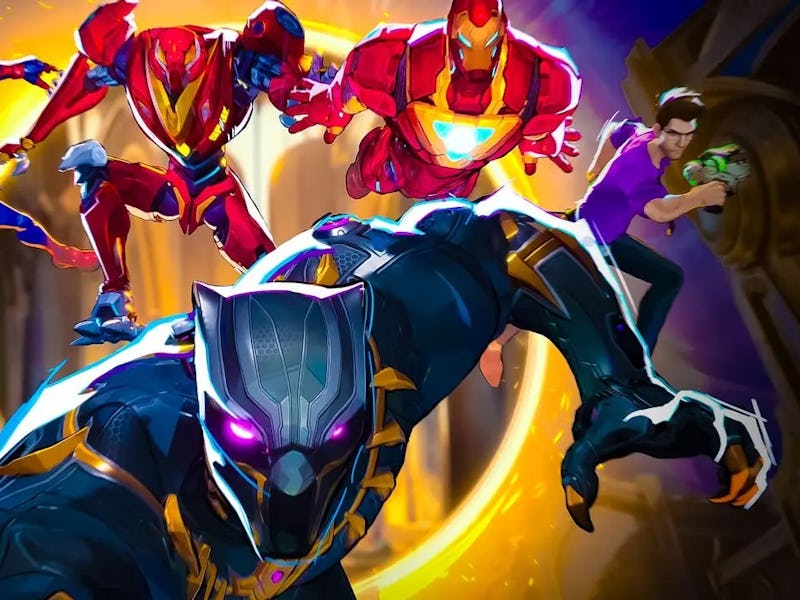Video Game Shooters Keep Coming Out But Everyone's Still Playing Fortnite
Too much of a good thing.

Shooter video games have remained one of the most consistently popular multiplayer genres for over a decade, evidenced by the ongoing success from the likes of Fortnite, Valorant, Apex Legends, and more. But another trend has also popped up alongside those game’s popularity — it’s harder than ever for something new to break into the scene. So many multiplayer games have come and gone over the last few years, but 2024 in particular has become an absurd hotbed for multiplayer shooters of all stripes; hero shooters, survival shooters, battle royales, you name it. There simply isn’t enough room for all these games to grow and flourish, and that means more than a few will likely never get the chance they deserves. This oversaturation is caused by a lack of innovation.
While doing quick research for this article, I came up with 23 different multiplayer shooters that have launched this year, or are planned to launch by this time next year. This includes Foamstars, Helldivers 2, Star Wars Hunters, Concord, Nightingale, XDefiant, EvilVEvil, Supervive, Fragpunk, Splitgate 2, and more. You’d be forgiven if you haven’t heard of all of those, it’s a ludicrous amount and not even a full list.
Games like Star Wars Hunters or Marvel Rivals have the advantage of adapting established series, garnering some attention on name alone.
The two main issues here are time and money. Big multiplayer shooters are generally designed to be huge time sinks, with an array of battle passes, rewards, and modes, to keep players engaged for weeks if not months. Some games like Helldivers 2 are fully paid experiences, making back a lot of their budget through sheer copies sold. Others, like XDefiant, are entirely free-to-play and rely entirely on microtransactions to make back the investment. Players spending money on a game like that suddenly becomes a lot more questionable if there are ten other shooters coming out at the same time, or they’re only playing something like XDefiant to tide themselves over until the next big release they’re excited for.
What’s most likely to happen is a big surge in popularity right at launch, followed by a sharp decline in player base in the months following, oftentimes inevitably leading to a game’s closure. We’ve already seen this happening with Helldivers 2, one of the most viral hit games of the year. Just five months after launch it’s dropped to an all-time low of 13,000 concurrent players, just a fraction of the 450,000 it had around launch. That’s nothing against the quality of Helldivers 2, and 13k is still a sizable number, but it’s indicative of interest simply waning in these kinds of experiences.
Helldivers 2 had the good luck to hit it big and had a publisher like Sony behind it with advertising, and that fact alone will probably give it legs to run for at least a year or two. That’s not the case with the more than a dozen other games, and it makes me extremely worried about the future of shooters in general. A new shooter has to be exceptional to be successful, not just “good,” and even then that might not be enough.
A shooter like Fragpunk has a wealth of interestingly fresh ideas, but is coming out in such a busy time that it’s competing with at least a half-dozen other games at once.
Because all these games are such time sinks, there simply aren’t enough hours in the week to keep up with multiple live service experiences, especially for people who have jobs, children, or other responsibilities. These games make money from players being invested, being willing to shell out money for that new season or battle pass, but if so many players have fallen off in the first month that’s a problem.
Coupled with this is the fact that data has shown players are reluctant to move away from mainstay games. A report from video game market analyst Newzoo revealed that 66 titles accounted for 80 percent of overall playtime in 2023, and of that number, 60 percent of playtime was spent with games released six years ago or more.
Fortnite is essentially four games in one now, making it harder than ever for new games to attract players away from it.
Titles like Fortnite, Apex, and Overwatch have a stranglehold on gamers, and their seismic popularity has allowed those teams to double down on development and add dynamic new modes and systems. When Fortnite releases a Lego mode that’s basically another entire game, that directly works against any up-and-coming shooter trying to vie for the same players. Then there’s the fact that players have already sunk hundreds of hours, and possibly hundreds of dollars, into these established games. You don’t want to move on and start something from scratch when you’ve invested so much into an experience that’s still ongoing.
Nothing is moving the needle enough to really make a dent in those established games, there’s a lack of innovation resulting in hero shooters and battle royales that all feel vaguely similar, with a few different mechanics or an established series it’s adapting. The result is a shooter release schedule that’s packed like a can of sardines, which we’re already seeing the effects of and one that makes the stakes higher than ever for studios already threatened by an industry filled with layoffs and cuts.